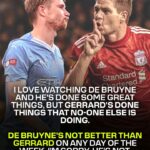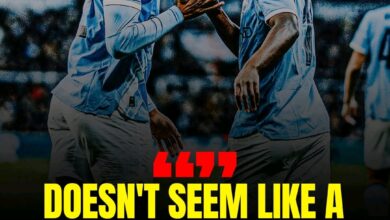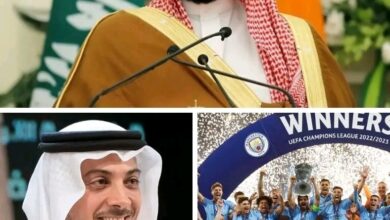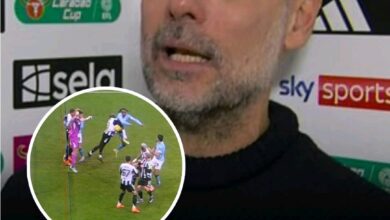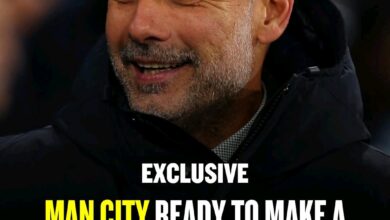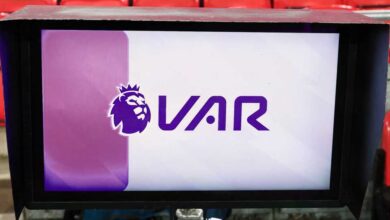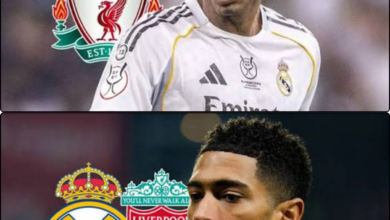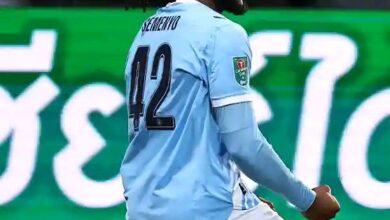Ferdinand names Man City star as the most important player in the Premier League
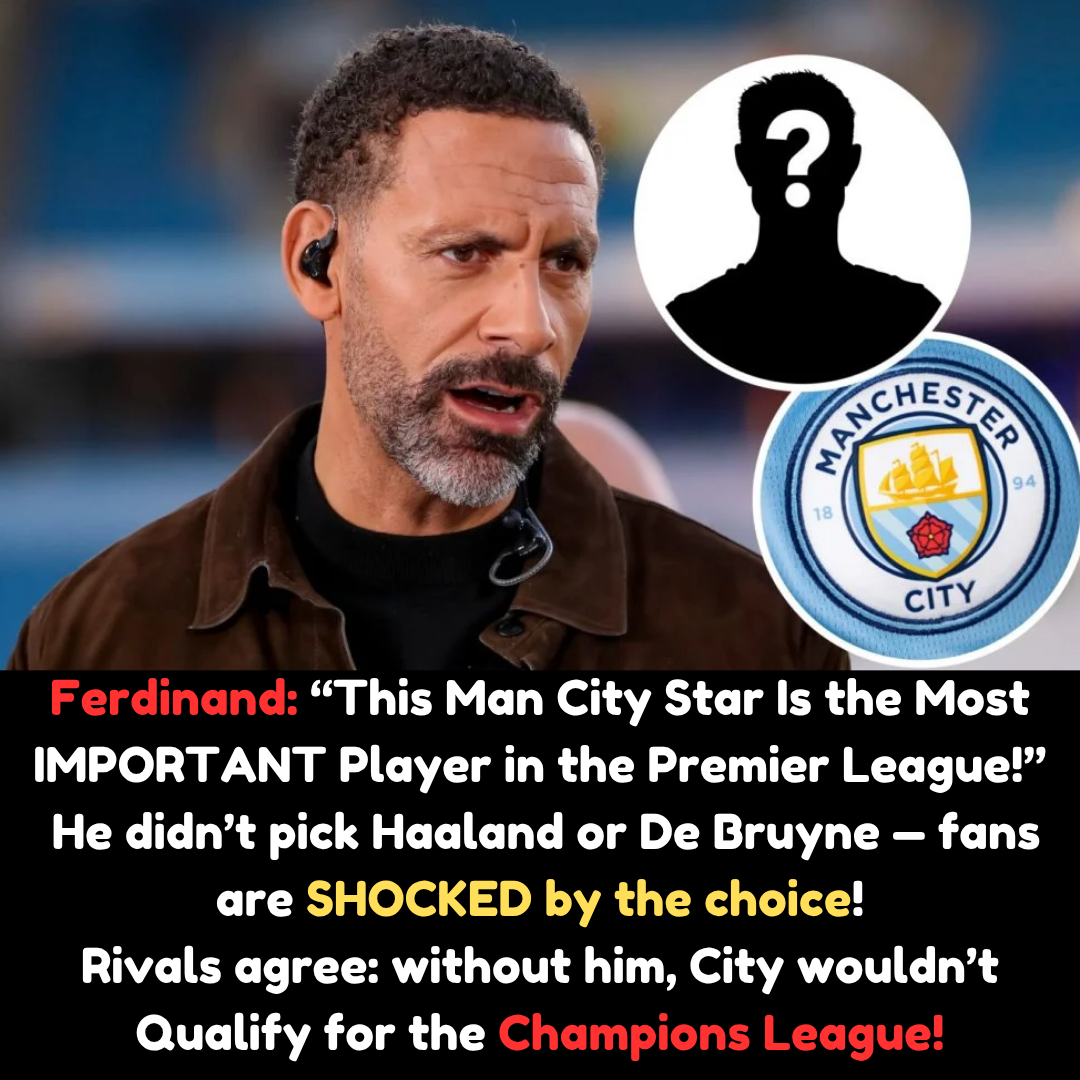
In the world of modern football, where attacking flair and goal-scoring prowess often dominate headlines, it takes a keen eye to recognize the subtle artistry that truly orchestrates success. Rio Ferdinand, the former Manchester United and England defender turned pundit, has cast his expert gaze beyond the glittering statistics and spectacular strikes to identify what he believes is the beating heart of Manchester City’s relentless machine: Rodri, the Spanish midfielder whom Ferdinand has boldly declared “the most important player for any team in the Premier League.”
This assessment came in the aftermath of Manchester City’s commanding 3-1 victory over FC Copenhagen in the Champions League, a performance that epitomized everything Ferdinand admires about Pep Guardiola’s meticulously crafted side. Yet while Kevin De Bruyne’s precision, Phil Foden’s finishing, and Bernardo Silva’s technical brilliance caught the eye, it was Rodri’s understated mastery that earned Ferdinand’s highest praise – and for good reason.
The Copenhagen Masterclass: A Study in Control
The match against FC Copenhagen served as a perfect microcosm of Manchester City’s evolution under Guardiola, and more specifically, of Rodri’s indispensable role within that system. From the opening whistle, City demonstrated the kind of controlled aggression that has become their trademark, systematically dismantling their Danish opponents with surgical precision.
Kevin De Bruyne’s early strike, a trademark finish across the goalkeeper after just ten minutes, set the tone for what many expected to be a routine victory. Yet football, as it so often does, had other plans. Magnus Mattsson’s equalizer for Copenhagen briefly threatened to disrupt City’s rhythm, sending the home crowd into raptures and creating the kind of atmospheric pressure that has historically troubled even the most experienced sides.
It was in this moment of potential crisis that Rodri’s true value became apparent. While the Parken Stadium erupted around them, City’s players remained remarkably composed, their passing patterns unchanged, their positional discipline intact. At the center of this unwavering calm stood Rodri, a 6’3″ figure whose influence extended far beyond his physical presence.
Bernardo Silva’s goal before half-time restored City’s lead, but it was the manner of their response – methodical, patient, and utterly controlled – that spoke to the deeper qualities Ferdinand had identified. Phil Foden’s injury-time strike merely added gloss to a performance that had been defined not by moments of individual brilliance, but by collective excellence orchestrated from the base of midfield.
The Numbers That Tell a Story
Statistics in football can be misleading, but some figures transcend mere data to become statements of fact. Rodri’s record with Manchester City reads like something from a different era of the game, when certain players seemed to possess an almost mystical ability to influence outcomes simply through their presence.
Since February 5, 2023, Manchester City have not lost a single match in which Rodri has featured – a streak that spans over a year and encompasses dozens of fixtures across multiple competitions. This is not merely coincidence or a statistical anomaly; it represents something far more profound about the Spanish midfielder’s impact on his team’s fortunes.
In the current season alone, Rodri has contributed six goals in 30 appearances across all competitions, a respectable return for any midfielder, let alone one whose primary responsibilities lie in the defensive third. Yet these numbers, impressive as they may be, tell only part of the story. They fail to capture the countless attacks snuffed out, the dangerous situations defused, the tempo controlled, and the rhythm maintained that constitute Rodri’s true contribution to Manchester City’s success.
Ferdinand’s observation about the correlation between Rodri’s presence and City’s results speaks to a deeper truth about modern football: that success is often built not on the spectacular, but on the systematic. While fans and media focus on the goals scored and saves made, it is often the less visible work – the interceptions, the simple passes, the positional awareness – that determines outcomes.
The Art of the Defensive Midfielder
To understand Rodri’s importance, one must first appreciate the evolution of the defensive midfielder role in contemporary football. Gone are the days when this position was occupied by purely destructive players, whose job was simply to break up play and distribute the ball to more creative teammates. The modern game demands something far more sophisticated: a player who can defend with intelligence, attack with purpose, and above all, control the tempo of matches with an almost conductor-like authority.
Rodri embodies this evolution perfectly. Standing at 6’3″ with the build of a traditional center-back, he possesses the physical attributes necessary to dominate aerial duels and tackle robustly. Yet it is his mental attributes – his reading of the game, his anticipation, his ability to position himself perfectly – that truly set him apart from his contemporaries.
Watch Rodri during any Manchester City match, and you’ll notice how he seems to be everywhere and nowhere simultaneously. He appears in the right position to intercept passes with such regularity that opposing teams begin to avoid playing through certain channels entirely. He drops deep to collect the ball from defenders with the timing of a perfectly synchronized watch. He advances into attacking positions with such subtlety that opponents often fail to track his movement until it’s too late.
This ability to influence matches without dominating them visually is perhaps Rodri’s greatest strength. Unlike some midfielders who demand the ball at every opportunity, Rodri chooses his moments carefully, understanding that sometimes the most impactful contribution is to make a simple pass and maintain possession rather than attempt something spectacular.
Ferdinand’s Expert Eye
Rio Ferdinand’s assessment of Rodri carries particular weight given his background and expertise. As a defender who spent his career reading the game from the back, Ferdinand understands better than most how a midfielder’s positioning and decision-making can affect an entire team’s defensive stability. His recognition of Rodri as “the conductor within this team” reflects not just admiration for individual skill, but appreciation for how that skill serves the collective good.
Ferdinand’s comments following the Copenhagen match revealed his understanding of football’s deeper complexities: “The rhythm of this game is control and that drives through one person and that is Rodri, he is phenomenal and he is the conductor within this team.” This observation cuts to the heart of what makes Manchester City so formidable under Guardiola – their ability to control matches not through individual moments of brilliance, but through sustained periods of tactical and technical superiority.
The former England captain’s emphasis on control rather than statistics reflects a mature understanding of football analysis. In an era where performance metrics and expected goals dominate discourse, Ferdinand’s focus on less quantifiable qualities like rhythm and control demonstrates why his opinions carry such authority within the football community.
Joleon Lescott, Ferdinand’s co-pundit and fellow former defender, echoed these sentiments with his own analysis of Rodri’s defensive contributions: “His importance when they’re out of possession, his ability to read the play nullify attacks especially when they’re high up the field. He wins the ball back and forces play to be so precise so high up the pitch and like Rio says he’s so important to the team.”
The Guardiola Effect
To fully appreciate Rodri’s role, one must consider the tactical system in which he operates. Pep Guardiola’s Manchester City plays a brand of football that demands extraordinary technical ability, tactical intelligence, and mental resilience from every player. The margin for error is minimal, the expectations enormous, and the scrutiny constant.
Within this system, the defensive midfielder occupies perhaps the most crucial position. They must serve as the link between defense and attack, the player who initiates moves and snuffs out opposition attacks with equal facility. They must be comfortable receiving the ball under pressure, capable of playing accurate passes over various distances, and possessed of the stamina to maintain their standards over 90 minutes and across an entire season.
Guardiola’s tactical approach also demands that his players understand not just their own role, but how that role fits within the broader team structure. Rodri’s success stems partly from his complete comprehension of Guardiola’s philosophy and his ability to execute it consistently, match after match.
The Spanish midfielder’s adaptation to English football has been remarkable. When he arrived from Atletico Madrid in 2019, many questioned whether his style would suit the Premier League’s pace and physicality. Those doubts have been emphatically answered. If anything, Rodri seems to have thrived on the challenge, using his intelligence and positioning to neutralize opponents who might possess superior pace or power.
Beyond the Statistics: The Intangible Impact
While Rodri’s goal contributions and passing statistics provide measurable evidence of his quality, his most significant contributions often occur in areas that don’t appear on any scoresheet. His presence alone seems to alter the behavior of opposing teams, forcing them to adapt their attacking patterns and limiting their creative options.
Opposition managers regularly identify Rodri as a key player to neutralize, recognizing that disrupting his rhythm can have a cascade effect on Manchester City’s entire game plan. Yet despite this attention, he continues to find ways to influence matches, testament to both his individual quality and his understanding of the game’s tactical nuances.
The psychological impact of Rodri’s presence extends to his own teammates as well. Knowing that such a reliable and intelligent player is patrolling the space in front of the defense allows City’s center-backs to take slightly more risks in their passing, secure in the knowledge that Rodri will be positioned to recover possession if moves break down. Similarly, City’s more attacking players can commit to forward runs with greater confidence, understanding that Rodri’s positioning and passing range will help create opportunities even from deep positions.
The Champions League Connection
Rodri’s importance to Manchester City extends far beyond domestic competition, as evidenced by his crucial goal in the 2023 Champions League final against Inter Milan. That strike, coming at the most important moment in the club’s recent history, demonstrated his ability to deliver when the stakes are highest.
The goal itself was typical of Rodri’s contributions – not spectacular in execution, but perfectly timed and clinically finished. More importantly, it showed his mental strength and composure, qualities that have become increasingly valuable as Manchester City has established itself among Europe’s elite clubs.
In European competition, where tactical nuances are often magnified and individual errors punished ruthlessly, Rodri’s consistency and reliability become even more valuable. His ability to perform at the same level regardless of the opposition or the stakes has been crucial to City’s sustained success in the Champions League.
The Broader Context: City’s Winning Streak
Manchester City’s remarkable run of eleven consecutive victories across all competitions, which included the Copenhagen match, provides context for Ferdinand’s assessment of Rodri’s importance. Such streaks don’t happen by accident; they require not just talent, but consistency, mental strength, and the kind of collective understanding that comes from having the right players in key positions.
Throughout this winning run, Rodri has been the common denominator, the steady presence around which City’s various attacking players have rotated and thrived. His ability to maintain the same level of performance regardless of who else is in the team has been crucial to City’s ability to manage fixture congestion and player rotation without losing momentum.
This consistency becomes even more impressive when considered alongside the various challenges City has faced during this period – different competitions, varying tactical approaches from opponents, and the inevitable physical and mental fatigue that comes with sustained success.
The Future Implications
As Manchester City continues to compete on multiple fronts, Rodri’s importance is likely to grow rather than diminish. The modern game’s increasing emphasis on tactical flexibility and the ability to control matches through possession make players of his profile increasingly valuable.
At 27 years old, Rodri is entering his prime years as a footballer. His combination of experience and physical condition suggests that he could maintain his current level of performance for several more seasons, providing Manchester City with a stable foundation around which to build future success.
The challenge for City will be managing Rodri’s workload to ensure his continued availability. As Ferdinand’s comments make clear, City’s record with and without Rodri demonstrates just how crucial he is to their success. This dependency, while testament to his quality, also represents a potential vulnerability that Guardiola and the club’s management must address.
Conclusion: The Quiet Revolutionary
In an era of football where individual achievement often overshadows collective success, Rodri represents something increasingly rare: a player whose greatness lies not in personal glory, but in service to the team. Rio Ferdinand’s recognition of him as the Premier League’s most important player reflects not just admiration for his technical ability, but appreciation for his understanding of football’s fundamental truths.
Rodri’s story is one of quiet revolution, of a player who has redefined what it means to be a defensive midfielder in the modern game. He has shown that in an era of tactical sophistication and technical excellence, the most valuable players are often those who make everyone around them better, rather than those who seek individual accolades.
Ferdinand’s assessment, backed by the statistical evidence of City’s unbeaten run with Rodri in the team and supported by the visual evidence of match after match of controlled excellence, makes a compelling case for viewing the Spanish midfielder as not just Manchester City’s most important player, but as one of the most influential players in world football.
As Manchester City continues their pursuit of multiple trophies this season, Rodri’s role will remain central to their ambitions. His ability to control matches, dictate tempo, and provide the foundation for his teammates’ creativity has become indispensable to Guardiola’s tactical approach and City’s continued success.
In recognizing Rodri’s importance, Ferdinand has highlighted one of modern football’s essential truths: that success is built not just on moments of individual brilliance, but on sustained excellence from players who understand their role within the collective. Rodri embodies this principle perfectly, making him not just Manchester City’s most valuable asset, but a model for how the game should be played at its highest level.




